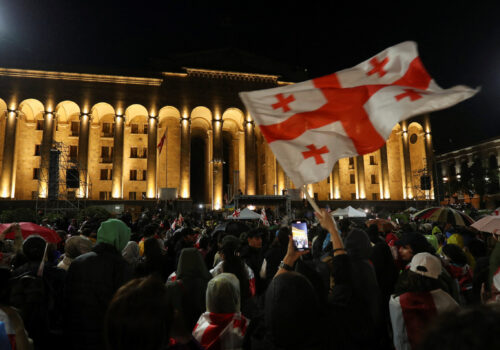On Tuesday, Georgia’s parliament overrode a presidential veto to pass a controversial foreign agent bill that, in recent weeks, drew thousands of Georgians into the streets in protest and received international attention. Less noticed, however, is that the ruling Georgian Dream party in recent weeks has fast-tracked the adoption of another concerning and consequential bill—the so-called “offshore law.” President Salome Zurabishvili vetoed the bill on May 3, and on Wednesday the parliament overrode her veto.
Unlike the foreign agent law, which was introduced following similar laws that had been adopted by Hungary and Kyrgyzstan, the offshore law seems to be just a Georgian Dream project. As the law goes into effect, Georgians and foreigners whose companies are registered in offshore zones will be able to move their assets and register companies in Georgia while receiving a one-time exemption from taxes and import fees, as long the transfer is completed by January 1, 2028. The technical tax aspects of the law mask larger political implications.
Paata Kvizhinadze, the Georgian Dream member of parliament who introduced this bill to the Finance and Budget Committee in April, explained that “due to recent changes in regulations by our Western partners, doing business in offshore zones is no longer interesting. Transparency, monitoring, and taxes have increased, which is why many are leaving the offshore zones . . . We should attract such individuals to move their businesses to Georgia.” He added that if such individuals want to move assets, such as aircraft, machine tools, or vehicles to Georgia from offshore zones, then they will also receive a one-time exemption from import duties.
The member of parliament also said this particularly concerning sentence: “We will give one-time tax forgiveness to individuals who want to move their businesses to Georgia and launder—I mean it will already be laundered—but if these assets are moved to Georgia . . . we will have more income from taxing them.”
Who benefits from the offshore law?
There are not too many Georgians who own airplanes in offshore zones, which narrows down the list of this law’s beneficiaries to those who (1) happen to own companies and assets in offshore zones and (2) are worried about getting sanctioned by the West.
Georgian opposition members believe that Bidzina Ivanishvili, the founder and honorary chairman of Georgian Dream, would be one of the key beneficiaries of this law. This claim is reasonable since Ivanishvili meets both criteria, and he has influence on Georgian Dream’s actions and decisions. Ivanishvili is a beneficial (real) owner of at least twenty companies in offshore zones, such as Panama and the British Virgin Islands. A Transparency International Georgia investigation in 2021 found that twelve out of these twenty companies in offshore zones owned at least seventy companies in Georgia, directly or indirectly.
But Ivanishvili’s companies in offshore zones could become embroiled in controversy. On April 9, two days before the Georgian Parliament introduced the offshore bill, a trial began in Panama against Panamanian company Mossack Fonseca, which used to provide services to one of Ivanishvili’s companies, Lynden Management. While there is no suggestion of wrongdoing with regard to Ivanishvili’s companies in Panama, the trial and its potential fallout could explain the desire to move assets from Panama, and why he might favor this amendment to Georgia’s tax code.
There is also the risk of new sanctions by the West on Ivanishvili as a result of Georgian Dream’s passage of the foreign agent law. On May 23, the State Department implemented a new visa restriction policy for Georgia that will apply to individuals who are responsible for the country’s democratic backsliding and the suppression of civil society. Notably, the ruling party appears to have braced for sanctions: The National Bank of Georgia bought five hundred million dollars’ worth of gold bars on March 1, 2024. Boosting gold reserves is a well-known defensive measure taken by regimes expecting to be sanctioned.
Why is the offshore law dangerous?
While Georgian Dream has claimed that this law would bring economic benefits to Georgia, it actually poses a threat to Georgia’s financial system. Sanctioned Russian oligarchs, for example, might start moving their money from offshore zones to Georgia. Letting Georgian Dream turn the country into a welcoming destination for oligarchs’ wealth would create problems not just for Georgia but also for the West and its sanctions-enforcement efforts.
One of the reasons why Western jurisdictions are tightening monitoring and compliance in offshore zones is their role in hiding sanctioned Russians’ wealth and hindering sanctions-enforcement efforts. Offshore zones, or tax havens, have three key characteristics that create a conducive environment for individuals who would like to evade taxes and/or sanctions: 1) Nominal or no taxes, 2) minimal or no sharing of information with foreign authorities, and 3) lack of legislative, legal, and administrative transparency.
Russian oligarchs have historically chosen to park their wealth in offshore zones like Cyprus to take advantage of minimal taxation and bank secrecy. If these Russian oligarchs got sanctioned by the West, as happened in 2014 and 2022, their wealth would be protected from sanctions by a network of shell companies and complex ownership structures. For example, an investigation by the International Consortium of Investigative Journalists revealed that ninety-six Russians who have been sanctioned since 2014 were linked to eight hundred separate companies in Cyprus in 2023. Cognizant of this challenge, Cyprus has started actively collaborating with US authorities on combatting sanctions evasion and financial crime.
Georgian Dream’s offshore bill, coupled with the National Bank of Georgia’s 2023 decision to exempt Georgian citizens from international sanctions without a court judgment, creates a conducive environment for individuals who would like to move their assets to Georgia to avoid taxes and potentially shield their assets from Western sanctions.
The thousands of people in the streets of Tbilisi in recent weeks show a strong desire among many Georgians for a Euro-Atlantic future. Washington and Brussels should make clear to Georgian politicians that the offshore law, like the foreign agent law, endangers that future.
Maia Nikoladze is the assistant director at the Economic Statecraft Initiative within the Atlantic Council’s GeoEconomics Center. Follow her at @Mai_Nikoladze.
Further reading
Mon, May 6, 2024
Dispatch from Tbilisi: Amid Georgia’s battle for democracy, Russian influence is already here
New Atlanticist By Eto Buziashvili
The West has criticized Georgia's “foreign agent” law. Now it must take action to help defend democracy and the rule of law in Georgia.
Thu, May 9, 2024
Russia’s Georgia strategy offers hints of Kremlin vision for Ukraine
UkraineAlert By
Russia's attempts to force Georgia back into the Kremlin orbit via political control offer a hint of Moscow's vision for a future settlement with a defeated Ukraine, writes Nicholas Chkhaidze.
Fri, May 17, 2024
Why Georgia’s ruling party is pushing for the foreign agent law—and how the West should respond
New Atlanticist By
The West’s response to Georgia’s foreign agent law should hold the ruling party accountable without punishing the wider Georgian population.
Image: Georgian Prime Minister Irakli Kobakhidze (R), former prime minister and chairman of the Georgian Dream party Irakli Garibashvili (L) and former prime minister and founder of the Georgian Dream party Bidzina Ivanishvili, take part in a pro-government rally in support of a bill on "foreign agents" in Tbilisi, Georgia April 29, 2024. REUTERS/Irakli Gedenidze



